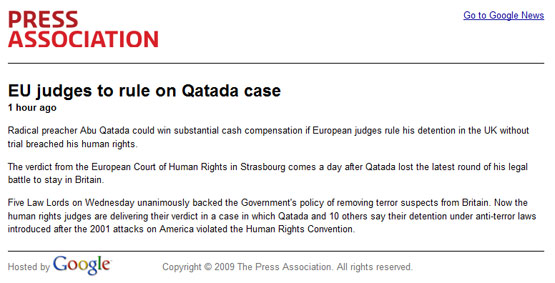In our last little discussion of the likelihood of an EU superstate (in amongst and partially as an offshoot of the rather silly sidetrack about jam), Josef noted that
there is a concern that this is how the EU will form itself into a “superstate.” Not through a series of demi-democratic treaties, but through a sort of slow, suffocating creep of boring, incomprehensible, impenetrable legislation. If you write a follow up post, Nosemonkey/J Clive, then I’d be interested to hear your take on this.
This is always a danger with any democratic system which relies largely on a more or less bureaucratic civil service to get things done. We like to think that all new legislation is debated and scrutinised by our elected representatives, dissected in minute detail and put to a vote considering only the best interests of the people – but it rarely happens like that.
In the UK, the vast majority of primary legislation is passed in the form of statutory instruments – new laws drawn up by civil servants and government ministers and put onto the statute books without (most of the time) parliament so much as being informed. In the UK in 2008 alone, there were 3,399 statutory instruments passed – that’s more than nine new laws a day that have come into existence without so much as a by your leave from an elected official. (That’s about average for the last 20 years, by the by – the number of statutory instruments began to creep up under Major, but have remained relatively constant since the mid-1990s, despite various claims that Blair used them more than any previous Prime Minister as another way of bypassing parliament.)
The vast majority of these statutory instruments are amendments to existing Acts of Parliament, fiddling with the details (most of them minor). Our last little debate got sidetracked on the use of apple geranium in jams other than those made with quince. Hardly the sort of thing – the logic goes – that it’s worth wasting parliament’s time with, and so precisely the sort of thing that would be sorted out in a statutory instrument. If the approval of British MEPs was needed for each of the law changes that statutory instruments bring in, then every one of the British parliament’s 646 MPs would have to go through more than five of the things every single day of the year – as well as all the major legislation, dealing with constituency concerns, being part of the government, holding the government to account and so on. (Remove those MPs who hold government office, it’d be more like 7 statutory instruments each to scrutinise and research the utility of per day – that’s a full-time job…)
In the EU, we have much the same problem. Having accepted the general principle that area X is best dealt with at EU level, it is impractical for MEPs to then scrutinise every subsequent tiny bit of legislation to ensure that it meets their high standards, and vote on every tiny clause about different types of fruit preserve in full session at the European Parliament. Because just as we, the people, delegate our powers of decision to our representatives at Westminster and Brussels/Strasbourg, so our representatives then delegate powers of drafting new laws to the various civil servants, be they in national civil services or the European Commission.
(At which point it’s worth noting that most EU legislation is not actually drawn up by the Commission – the EC only has a staff of c.38,000 – less than a third of that of the UK Department of Work and Pensions alone, and nowhere near enough to do everything that the Commission is accused of doing. Instead, pretty much all EU legislation is drawn up by the civil servants of the various member states, checked by civil servants in other member states, and then rubber-stamped by the Commission once it’s been looked at my enough bureaucrats in enough member states.)
And so in the normal course of events, yes – dozens of new laws will likely come into force every week without having been so much as glanced at by an elected official. But such developed social systems as ours could not possibly function any other way – unless you think that the civil service should be elected, and that it’s a practical possibility to find several hundred thousand people willing to campaign for such a thankless job (not to mention several hundred thousand people willing to turn out and vote on what would prove to be an almost daily basis as retirement and transfers necessitate by-elections to fill vacant posts…) And in any case, the general principles are already always voted on by elected representatives at both national and EU level – as long as they are doing their jobs properly, they shouldn’t vote through sweeping new powers that would allow unelected bodies or people to suddenly advance major changed without anyone checking them first. (Though that’s not to say that there isn’t always a danger that this could happen, as we found out in the UK only recently with the – thankfully defeated – Legislative and Regulatory Reform Bill, which would effectively have made parliament obsolete and allowed any government minister to make any law they liked, when they liked.)
When it comes to the EU, the real fear of competence creep was epitomised by this glorious clause (Article 308 EC):
If action by the Community should prove necessary to attain, in the course of the operation of the common market, one of the objectives of the Community, and this Treaty has not provided the necessary powers, the Council shall, acting unanimously on a proposal from the Commission and after consulting the European Parliament, take the appropriate measures.
In other words, the EU could grant itself whatever powers it liked. Or, at least, it could after unanimous agreement from the governments of the member states in the Council, and after being passed by the elected representatives of the European Parliament – but most anti-EU types conflate Council, Parliament and Commission into one monolithic-sounding “EU” to make these things sound more scary.
So, for more powers to pass to the EU, even with the existence of the “competence clause”, you’d still need unanimous agreement between the governments of all 27 member states, plus a majority in the European Parliament. Hardly that scary – but even so, the Lisbon Treaty amended that same article (now Article 352) to clearly delineate (in line with the subsidiarity principle introduced with Maastricht back in 1992) just where competences lie between the EU and member states, as well as explicitly excluding common foreign and security policy as an area where the competence clause could be used to grant the EU more powers.
Oh yes, and Article 352 also introduced a new clause obliging the Commission to involve national parliaments in any moves to grant the EU more powers. So that’s unanimous agreement by all 27 member state governments, passing a vote in the European Parliament, and passing votes in the parliaments of all 27 member states before the EU can claim any major new powers for itself. Hardly a major worry.
In the meantime, life will continue as normal, with dozens upon dozens of minor changes to minor laws being brought into force merely by civil servants via statutory instruments and their equivalents across Europe – and then (despite some of the claims made in our last comment thread that alterations to jam legislation would require ratification by the Council, Parliament, and so on) amended just as easily if they turn out not to be workable.
Is there a danger that some of these laws will be bad ones? Of course there is. But at least they are generally being drawn up by civil servants who are experts in their field (rather than members of parliament who tend to be generalists), and at least they can be corrected with ease.
Is there a danger that such civil servant-drafted laws could slowly grant more power to institutions that we aren’t willing to give them? Well, a poorly-worded new law always has the potential to be misinterpreted. That’s what we have judges and courts for – if such poorly-worded laws are found, they can be challenged and struck down, if a simple amendment isn’t enough. After all, both the existing Article 308 and the proposed new Article 352 explicitly state that both the Council and the Parliament have to approve any new EU power-grab – and treaty law will always take precedence in such cases.
In short: Modern western liberal democracies are very complex systems, packed full of checks and balances that have been worked out over the course of many centuries. The EU is not a true liberal democracy, but shares many of its forms and functions. As such, I remain confident that there are enough checks and balances in place to ensure that the only way the EU will gain more powers is if the member states of the EU want to delegate more powers to it. It will not -can not – happen by accident. Unlike in the British system, where bad laws like the Legislative and Regulatory Reform Bill can easily slip through parliament if the government has a sufficient majority and MPs are sufficiently cowed, the EU has 27 additional chances of spotting them before they get anywhere near the statute books – something that the Lisbon Treaty would only have underscored by bringing national parliaments into the equation as well. Once again, it’s hardly the stuff of an impending superstate.

 For those coming in late, the superstate series so far:
For those coming in late, the superstate series so far: For as long as there have been eurosceptics, there have been arguments that the EEC/EU is part of a grand plan to create a United States of Europe. Why? Well, largely thanks to the dreams of some of the organisation’s founding fathers (from a generation, it should be noted, which had mostly lived through two world wars – but still…)
For as long as there have been eurosceptics, there have been arguments that the EEC/EU is part of a grand plan to create a United States of Europe. Why? Well, largely thanks to the dreams of some of the organisation’s founding fathers (from a generation, it should be noted, which had mostly lived through two world wars – but still…)